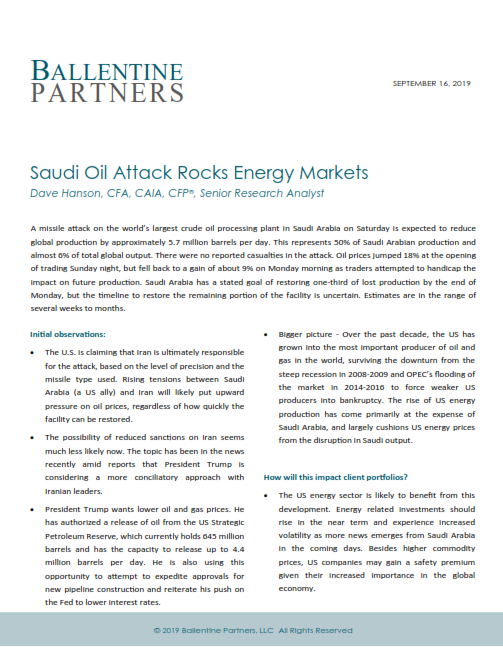A missile attack on the world’s largest crude oil processing plant in Saudi Arabia on Saturday is expected to reduce global production by approximately 5.7 million barrels per day. This represents 50% of Saudi Arabian production and almost 6% of total global output. There were no reported casualties in the attack. Oil prices jumped 18% at the opening of trading Sunday night, but fell back to a gain of about 9% on Monday morning as traders attempted to handicap the impact on future production. Saudi Arabia has a stated goal of restoring one-third of lost production by the end of Monday, but the timeline to restore the remaining portion of the facility is uncertain. Estimates are in the range of several weeks to months.
Initial observations:
The U.S. is claiming that Iran is ultimately responsible for the attack, based on the level of precision and the missile type used. Rising tensions between Saudi Arabia (a US ally) and Iran will likely put upward pressure on oil prices, regardless of how quickly the facility can be restored.
- The possibility of reduced sanctions on Iran seems much less likely now. The topic has been in the news recently amid reports that President Trump is considering a more conciliatory approach with Iranian leaders.
- President Trump wants lower oil and gas prices. He has authorized a release of oil from the US Strategic Petroleum Reserve, which currently holds 645 million barrels and has the capacity to release up to 4.4 million barrels per day. He is also using this opportunity to attempt to expedite approvals for new pipeline construction and reiterate his push on the Fed to lower interest rates.
- Bigger picture – Over the past decade, the US has grown into the most important producer of oil and gas in the world, surviving the downturn from the steep recession in 2008-2009 and OPEC’s flooding of the market in 2014-2016 to force weaker US producers into bankruptcy. The rise of US energy production has come primarily at the expense of Saudi Arabia, and largely cushions US energy prices from the disruption in Saudi output.
How will this impact client portfolios?
- The US energy sector is likely to benefit from this development. Energy related investments should rise in the near term and experience increased volatility as more news emerges from Saudi Arabia in the coming days. Besides higher commodity prices, US comp
anies may gain a safety premium given their increased importance in the global economy. - Producers, including private energy companies, can use this opportunity to hedge future production by locking in higher prices at more profitable levels. As news about the repair timeline develops, longer-dated futures will fluctuate, and producers may try to jump in.
- Higher prices should lead to more production, driving more liquids and gases through pipelines and generating higher revenue for pipeline owners.
- Other safe haven assets will likely increase in value, while investors wait and see how Saudi Arabia, the US, and Iran react. Geopolitical tensions are likely to rise, capping equity prices and putting downward pressure on interest rates, at least in the short run.
- A sustained rise in energy prices is likely to further slow global economic growth, particularly in countries heavily dependent on oil imports.
Learn more about David Hanson, CFA, CAIA, CFP®, Senior Research Analyst.
This report is the confidential work product of Ballentine Partners. Unauthorized distribution of this material is strictly prohibited. The information in this report is deemed to be reliable but has not been independently verified. Some of the conclusions in this report are intended to be generalizations. The specific circumstances of an individual’s situation may require advice that is different from that reflected in this report. Furthermore, the advice reflected in this report is based on our opinion, and our opinion may change as new information becomes available. Nothing in this presentation should be construed as an offer to sell or a solicitation of an offer to buy any securities. You should read the prospectus or offering memo before making any investment. You are solely responsible for any decision to invest in a private offering. The investment recommendations contained in this document may not prove to be profitable, and the actual performance of any investment may not be as favorable as the expectations that are expressed in this document. There is no guarantee that the past performance of any investment will continue in the future.





